Reviews
Amère victoire
Nicholas Ray
France/USA, 1957
Credits
Review by Andrew Schenker
Posted on 02 September 2008
Source Columbia Tri-Star DVD
Categories The Mystic: The Films of Nicholas Ray
Late in Nicholas Ray’s fascinating World War II film Bitter Victory, Captain Leith turns to his colleague Brand and, speaking in a tone of sly insinuation, delivers an accusation that stands at the heart of the picture’s concerns with the metaphysics of war; “We’re all murderers now, aren’t we? Welcome to the club.” Taken by itself, the quotation seems a simple enough observation about the ways in which warfare turns seemingly civilized men into savages, but proper contextualizing reveals Leith’s words - as well as the film itself - to be far more complex than mere superficial platitude.
Ray’s picture, which chronicles a covert World War II mission carried out by a group of British soldiers in Libya, finds Leith and Brand splitting an uneasy command of the squadron. Complicated by Brand’s discovery of Leith’s prior romantic relationship with (and obvious lingering attraction for) the former’s wife, the psychological give and take between the two leads plays out with increasing hostility, intensifying as they conduct their charges across an unrelenting desert. Following an initial burst of action in which the party carries out their mission (the retrieval of a handful of documents from the German headquarters) with relative ease, and which Ray plays for fast-paced thrills, the rest of the picture proceeds with relative lack of event, trading a fast cut aesthetic for languorous moral/metaphysical drama.
As the men slowly wend their way across the Sahara, the latent tensions between the two captains come quickly to the fore. Having witnessed a hesitation on Brand’s part when faced with the necessity of shooting a German guard at point range, Leith begins calling into question Brand’s bravery. Rivals for the same woman as well as subjects to the same rigid system that rewards “courage” and punishes “cowardice,” the two men become inextricably linked by Brand’s refusal to shoot and Leith’s observation of the event. With Leith’s eyewitness account the only evidence of Brand’s non-action (and the revelation of which would be sufficient to undermine him both personally and professionally),the former becomes particularly inconvenient to Brand, and it’s not long before he starts plotting to eliminate his rival.
But while the film offers a useful critique of the sort of macho notions of courage that often lead to unnecessary destructiveness, Ray soon expands the incident of cowardice into a wider context in which he can more fully explore the metaphysical implications of warfare. In the central exchange between the two men, Leith notes that while Brand has no difficulty killing from a distance, he is unable to kill a man up close. Leith, who earlier had been forced, at the implicit order of Brand, to place a pistol down a dying colleague’s throat and shoot, taunts his nemesis with the notion that the true nature of “war” exists only in this point-blank shooting, in which man’s capacity for murder can be confronted without any mediating distance. In war, Leith suggests, man is forced to acknowledge a certain potential for violent action that generally remains latent in peacetime. For an army-lifer like Brand, armed conflict may always be a reality, but as an officer he can always delegate the unpleasant tasks to a subordinate. Despite his making a career out of “war,” Brand has always avoided dirtying his hands with the sort of killing that forms the true essence of armed conflict.
That is, until finally he’s no longer given the choice. Attacked in his sleep by a mutinous Arab colleague, he skillfully disarms his antagonist and shoots him to death, setting the scene for his final interaction with Leith. Which, of course, brings us back to that initial bit of dialogue; “We’re all murderers now,” Leith greets his counterpart after the incident, “welcome to the club.” Only by looking a man in the face as you kill him can one understand the true nature of war - and the film largely suggests - of humanity as well. In the hothouse environment of the desert (insisted upon by Ray’s tight framing, which, as Eric Henderson notes, “emphasizes the isolation” of the setting despite the expansive tendencies of the ‘Scope camera), man’s worst tendencies fulfill themselves and murder becomes a fact of life. But even in this surreal testing ground (the surrealness of the desert best evoked in one memorable series of shots in which several soldiers lay dying in the sand while swarms of giant insects scuttle around them), man is also granted an unexpected capacity for decency. Having acknowledged an unlikely kinship with his rival - albeit one only available to the two men once they’ve each understood the other’s penchant for killing - Leith sets about saving Brand’s life, pulling him to the ground as a sandstorm sets in.
Arriving back at the base after the mission, Brand is awarded a medal for bravery. But having penetrated to the heart of warfare, such token gestures - emphasizing values that the film has already discredited and covering the brutality necessary to the enterprise with the lying veneer of civilization - can no longer have any meaning for him. Pinning the medal on the heart of a practice dummy, Brand both acknowledges the futility of the award (commemorating a mission that can have little lasting effect in a war that will claim many more lives) and makes some effort toward disassociating himself from the implications inherent in its receipt. After all, the winning of the medal was only made possible through murderous action and by displacing the medal onto the dummy, Brand is in effect saying he is unlike Leith, that he is not a killer. The totality of the film suggests, however, that anyone truly involved in war has no real recourse to this kind of circumvention. To be at war is to acknowledge the individual’s capacity for committing acts of brutality, acts that cannot be dismissed as anomalous outcroppings of human behavior but must finally be recognized for what they are: part of mankind’s essential propensity for violence.
More The Mystic: The Films of Nicholas Ray
-
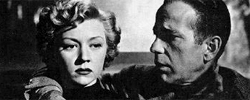
In A Lonely Place
1950 -

They Live By Night
1948 -
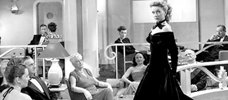
A Woman’s Secret
1949 -
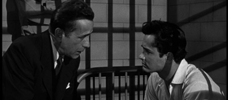
Knock on Any Door
1949 -

Born to Be Bad
1950 -
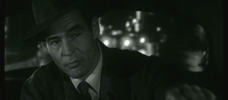
On Dangerous Ground
1952 -
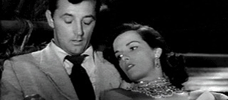
Macao
1952 -
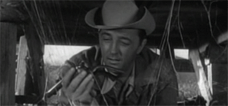
The Lusty Men
1952 -

Johnny Guitar
1954 -
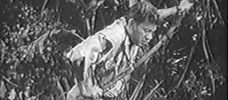
High Green Wall
1954 -

Rebel Without a Cause
1955 -

Bigger Than Life
1956 -

Hot Blood
1956 -

The True Story of Jesse James
1957 -
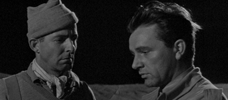
Bitter Victory
1957 -

Party Girl
1958 -

King of Kings
1961 -

55 Days at Peking
1963 -

The Janitor
1974 -

We Can’t Go Home Again
1973-1976 -
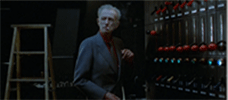
Lightning Over Water
1980
We don’t do comments anymore, but you may contact us here or find us on Twitter or Facebook.



